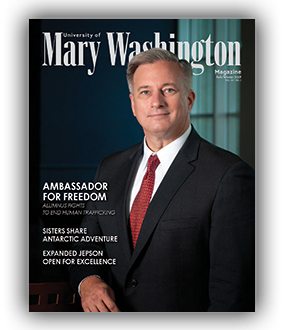
At her Iowa lab, researcher Reggie Harbourne investigates the ways babies learn to use their minds and bodies together.
Regina “Reggie” Tambellini Harbourne ’76 stops short of calling herself a pioneer.
The assistant professor at Duquesne University is a Catherine Worthingham Fellow, the highest honor bestowed by the American Physical Therapy Association.It’s an accolade that reflects her forward-thinking research tying an infant’s motor skills to cognitive abilities.
“If we advance motor, we advance cognitive,” said Harbourne, director of the Infant Development Lab at Duquesne, which investigates how babies learn to use their bodies and minds together. “I call myself the queen of sitting because I’ve done so much research on infants learning how to sit.”
The science enthusiast followed a STEM path before it was a mainstream choice for women. She entered Mary Washington in 1972 as a pre-physical therapy major, racking up the necessary prerequisite science credits for admission to the Medical College of Virginia, where she finished her bachelor’s degree. She earned a master’s degree from the University of North Carolina and a Ph.D. from the University of Nebraska.
Mary Washington went coed in 1970, but the student body was still mostly female when Harbourne enrolled.
“I didn’t necessarily want to go to a women’s school; I didn’t pick Mary Washington because of that,” Harbourne said. “But once I was there, I met many strong women. I had a lot of role models in the faculty, especially in biology, and really being around them was part of my formation. When that many women are around you, you don’t look for men to talk or have the ideas. It frees you to be a leader.”
At W.T. Woodson High School in Fairfax, Virginia, Harbourne envisioned herself strolling the Lawn at the University of Virginia or traipsing about the southwestern part of the state at Virginia Tech. A senior-year operation on her right leg to remove a tumor altered that.
“I ended up looking for a college that would be easy to walk around, so Mary Washington was actually a good size for me,” she said. She toted crutches to Fredericksburg and was never off them. “I’ll tell you what, though. Those brick sidewalks are very pretty, but when they are wet, they are slippery for crutches!”
Harbourne bunked in close quarters with 10 women in a strip of rooms beside the porch in Willard Hall. The ground-floor location made coming and going and navigating middle-of-the-night fire drills easier. “We affectionately called it ‘Psych Ward’ because it was separated from the rest of the building,” she recalled with a giggle.
Coming from a family of Pennsylvanians – her grandparents ran an Italian restaurant in Pittsburgh – Harbourne found her Southern pals amusing. One asked, “Didn’t your grandmama teach you to balance a teacup on your knee?” She answered, “My grandmama made 500 ravioli every day.”
“We enjoyed our differences,” said Harbourne, who remains in touch with a few of her former roommates. “You hear horror stories about the first year of school. … We had a good time. It’s really all about the people, and I love the friends I made there.”
